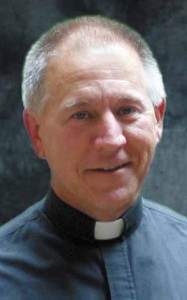By Fr. Bud Grant
Right now, in Lima, 194 countries are drafting a compact on climate change to be signed in Paris next year. One proposal, supported by the U.S., is to make the agreement non-legally binding. Indeed, the Kyoto Protocol of 1997 ultimately foundered because the U.S. (then the world’s greatest polluter) refused to submit our sovereignty to internationally binding laws. Similarly, in Copenhagen in 2009, the U.S. and China (the two top polluters) circumvented the stumbling proceedings by acting bilaterally with no legally binding strings attached. The result, according to a negotiator representing 130 developing countries was “nothing short of climate change skepticism in action” (Guardian 12.18.09).

It is happening again. On Nov. 12 the presidents of the United States and China announced another bilateral agreement. The U.S. is to reduce CO2 emissions by at least 26 percent; China is to peak its emissions and get 20 percent of its energy from non-fossil fuels by 2030 (Tampa Bay Times, 11.19.14). This is non-binding and excludes discussion with those 130 developing countries. The New York Times calls this an “ambitious,” “landmark,” and a “signature achievement” (11.11.14). Others are “skeptical” and call it “self-delusion” and “demoralizing” (Investor’s Business Daily-IBD, 12.08.14). At heart is the fact that the world’s two greatest powers — and polluters — won’t be trapped by the international community into legally binding rules. But 130 of those countries are cash poor, politically precarious and particularly threatened by climate change: they want binding action.
Pope Francis seems to have all of this in his mind when announcing, recently, an upcoming encyclical on climate change to coincide with the Paris meeting. We don’t know what he will say, but we do know that he, along with his last two predecessors, has made a clear connection between climate change and its disproportionate effects on the poor, calling it “The moral imperative” (The Tablet 11.13.14). This has been the great scandal of climate change all along: those who suffer the most are not the ones causing it. Conversely, those who benefit the most in the short term pay the lowest costs in health, security, development and ecological destruction.
This is an old story. Progress in dealing with climate change is so glacial (pun intended) that we have had to move the goal posts closer just to claim some success and in order make further successes plausible. We no longer debate ways to halt this beast of our own making but rather of ways to “adapt” to it and “mitigate” its impact, both of which are a lot easier for the rich than for the poor, more manageable for the perpetrators than the victims. Yet the debates still bog down in the fear of the powerful to submit to binding commitments. Why? Ideological issue of sovereignty aside, the issue is downright banal: who will pay?
The UN Climate Change spokeswoman, Christiana Figueres, along with the 192 countries that are not China and the U.S. and even those few relics who still call climate change a “green shakedown for money” all agree that it will cost trillions of dollars to “decarbonize the planet” (IBD). If treated only as an economic question and a political choice, enough will never be done. American politicians will use the bogeymen of “job loss” and higher energy prices to stop action. Alarmingly, the probable chair of the U.S. Senate Environment and Public Works Committee will be James Inhofe, not quite the last climate change denier on earth, since he is joined in Washington by other antediluvians John Cornyn, Ted Cruz, Mike Enzi, Ron Johnson, Mitch McConnell and David Vitter (Republic Report, 10.25.14).
This is why the Catholic position on climate change — so consistent and so prophetic for over 45 years — is needed. Our heritage of social teachings, grafted onto green ethics, provides the only persuasive argument for the rich choosing to suffer more so that others may suffer less. It is justice, but it is more; it is the incarnation.
(Father Bud Grant is a professor of theology at St. Ambrose University in Davenport.)








